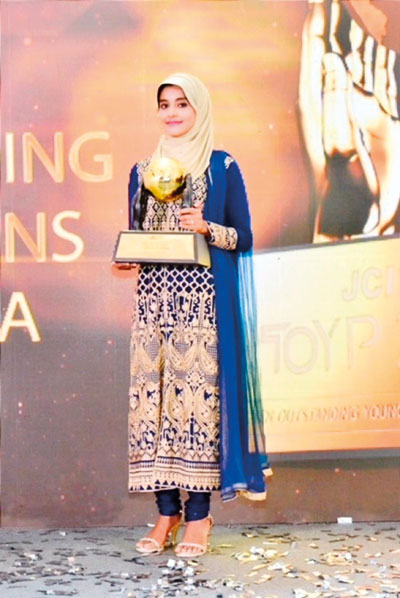Committed to her cause
Recently recognized by the Junior Chamber International as one of the youngest Ten Outstanding Young Persons (TOYP) of Sri Lanka, 28- year -old Razni Razick is all shy smiles as she shares her interests towards children, world peace and human rights that led her name being among some of the greats as one of the youngest people to be nominated this year.

Razni with her award
Over the past years the TOYP award which has been previously bestowed to a number of prominent and outstanding personalities in Sri Lanka such as Rosy Senanayake, Prof. Ravindra Fernando, Julian Bolling, Otara Gunewardene, Dr. Sunil Ariyaratne, Muttiah Muralitharan and Kumar Sangakkara to name a few.
Razni received her academic qualifications in early childhood education and child psychology, her career further enhanced through her association with the Doctor’s welfare society at the Kandy teaching hospital. She went on to pursue counselling and also taught primary grades and special needs students.
“I was always the babysitter,” she says of her passion for teaching and childcare stemming from hours she spent with kids in the past. “I also followed any kids education class I could get my hands on,” she says.
In collaboration with an inspiring group of philanthropists Razni helped open “Pearls of Paradise” – a safe haven for orphan and abandoned children. This home currently houses 65 female children from around the country. To help alleviate poverty she also provided a platform where she initiated the procession of Care Station.
Her initiative focuses on the empowerment, education and housing of the homeless . Razni elaborates that she was also a part of the DIAC (De-institutionalization and Alternative Care) initiative in the central province – a semi-formal network started by the government, as a progression to help de – institutionalisation of children in Sri Lanka. At present she is employed as a counselor for refugees for the UNHCR program partnered by Muslim aid.
“I had a rather pampered childhood,” Razni comments being the only girl in her home of four. She lovingly describes her family, comprising members equally passionate in serving the community. Her father a civil engineer, her mother and brother both lawyers and her sister-in-law a doctor have also dedicated their life’s work to helping people.
“In my family our door was always open for anyone in need,” she says. However she adds “I didn’t really see suffering until 2012,” when she was just 24 years old after paying a visit to the Centre for Street Children. Having personally witnessed their pain and grief Razni resigned as a childhood educator and decided to become a full time volunteer and activist instead, a secret she kept from her family for the initial six months.
“Reality is very sad and hard to accept,” she says. Recalling the heartbreaking tales of girls as young as 13 years handing over their babies to the rehabilitation centre so that they may go to work or school. Most care homes house these young women until they are 18 or when they are asked to leave – uneducated and alone. “It’s a cycle” Razni says, one she is striving to break.
The street kids are “the bravest, strongest and most resilient children I know,” she smiles. “There are so many misconceptions about street children.” The prejudices to street people make it difficult to help them grow and be empowered as they are stuck in a mindset Razni says. However, “If they take a liking to you they will immediately do anything for you… I am at my safest with them,” she adds.
“The award was something that just happened to me,” she says bashfully. The passion in which initially she spoke about her kids and cause diminishes a little as Razni now becomes increasingly shy when speaking about her outstanding accomplishment. Having being pushed by a friend Razni shares “I Initially didn’t want to apply,” adding “I felt like I was losing my purpose and I don’t believe in getting credit for something like what I do.” Although extremely grateful for the recognition she hopes it in turn highlights her cause and passions more than herself. She further adds with an ironic chuckle “Our biggest challenge as social workers is getting help.” As her laughter dies she shares “I think the world would be a better place if no one cared who took credit for what.”
Coming back to her passions Razni says “Many families are determined to get out of their situation but don’t know how to or where to go from there.” Although “Sometimes they just need someone to talk to,” she states adding that this is where her work mainly applies.
“If you take one step for them they will also move at least 10 steps forward themselves,” Razni shares adding that all kids and adults just need someone to believe in them.
Although she disregards most stereotypes there are some which she does agree with adding that most people who face poverty “don’t have even an identity card and may not understand the value of money and are unable to save or take care of their finances, looking for a way to make “easy money”. In situations such as these Rani shares “It’s difficult to be positive.”
The commitment and perseverance displayed by Razni is encouraging as she recounts the stories and struggles of her work life. To future activists Razni shares “Consistency is key”. “We must always be committed to our cause”.
For more information on how to help log on to www.pearlsofparadise.org and www.carestation.lk
(T P)


